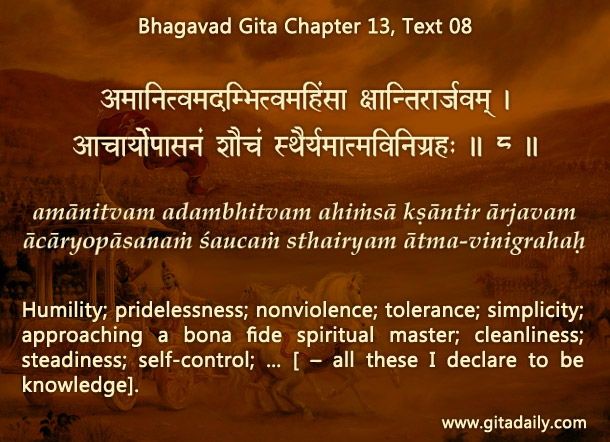Humility is foundational to authentic spirituality. The Bhagavad-gita (13.08) lists humility as the first among the virtues that comprise wisdom.
Krishna enjoins Arjuna to cultivate this virtue, yet he apparently doesn’t help in such cultivation: he repeatedly glorifies Arjuna profusely with epithets such as the greatest member of his dynasty (kuru-sattama: 04.31) and the greatest human being (purusharshabha: 02.15). Even Arjuna seems to do the opposite of cultivating humility: during the course of the ensuing war, he repeatedly glorifies himself as the world’s greatest archer.
Have the Gita’s speaker and student both forgotten its instruction to cultivate humility?
Not at all. Rather, through their examples, they help us reject simplistic stereotypes of humility – stereotypes that center on one’s own unworthiness, often becoming justifications for shirking from one’s responsibilities: “I am so fallen, I can’t do it.”
When Krishna entrusts devotees with the responsibility for doing extraordinary services, they don’t let feelings of unworthiness disempower them. Instead, they fix their minds on Krishna, knowing that he is the source of all powers: “If I strive sincerely to serve Krishna, he will provide whatever is needed.” With this humble confidence, devotees gird themselves to do whatever is required for their service – even if it entails activities seemingly antithetical to humility such as receiving praise or even praising oneself.
Krishna glorifies Arjuna to inspire him in his herculean responsibility as the foremost warrior among the troops striving to establish dharma. And, since few things energize troops as much as their leader’s self-confidence, Arjuna boosts their morale, whenever required, by humbly yet honestly proclaiming his prowess.
Thus, the Gita’s context demonstrates humility in action: not as justification for shirking responsibility but as inspiration to gain the confidence for meeting life’s challenges boldly and discharging one’s responsibilities determinedly.


in which situations should a devotee praise himselp and for what purposes should a devotee praise himself ?
Answered here:
http://www.thespiritualscientist.com/2014/07/when-can-a-devotee-seek-honor-instead-of-being-humble/
ys
ccdas